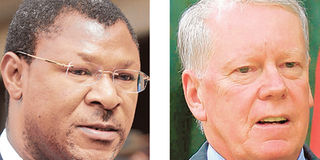Protocol not breached: US response to Kibaki’s letter

Foreign Affairs Minister Moses Wetan'gula (Left) and US ambassador to Kenya Michael Ranneberger (Right).
The US state department has defended itself against President Kibaki’s accusation that it violated protocol by writing threat letters to Kenyan officials.
The letters, written by US assistant Secretary of State Johnnie Carson, were sent to 15 prominent Kenyans.
“We beg to differ with the President (Kibaki) as to whether the (Carson) letter violates international protocols. We are very diligent in respecting those and we believe our conduct is in keeping with international protocols,” said the official.
When the official, who cannot be named due to the sensitive nature of the issue, was asked whether Kenya was not being unfairly singled out, given the muted US response to the killings in Uganda, and Prime Minister Raila Odinga’s comments on the relative lack of American criticism of governance in Saudi Arabia and Egypt, the official said: “We treat each country individually, based on its own merits and in regard to our bilateral relationship. Where there have been instances when we perceive countries have violated human rights, democracy etc, we have expressed our concerns to them privately and in other cases publicly.”
Last week, the US threatened to deny 15 ministers, permanent secretaries, MPs and other prominent Kenyans visas to the US if they do not support reforms and oppose violence.
The letters written by Mr Carson also warned that the US may block Kenya’s aid requests at international financial institutions.
Foreign Affairs minister Moses Wetang’ula, who got a list of the 15 from US ambassador Michael Renneberger, would not reveal who the officials were.
President Kibaki took exception to the warnings, saying the US breached protocol by writing directly to the individuals. He wrote a letter to US President Barack Obama.
In Tuesday’s interview, the State Department official said it was not unusual to ban the ministers of another government from the US.
“This public action (in the case of Kenya) came in response to a lack of action on their part. This is not the first step we have taken. It is one step after many others. We are acting because it is important to maintain stability in that country, but it seems, unfortunately, that this message has not gotten through."
Separately, the Nation can finally reveal the text of the letter sent by President Kibaki to Mr Obama in reaction to letters sent by the US to 15 prominent Kenyans. He started the letter in a friendly way “expressing warm and fraternal greetings’’ and acknowledged the cordial and broad based bilateral relations.
President Kibaki told Mr Obama: “We appreciate your concern with the pace of Kenyan reforms. I want to assure you that these concerns are also real to us.’’
President Kibaki apprised Mr Obama on what is happening in Kenya: The abolition of the previous electoral commission and the establishment of a new interim one; and establishment of an independent committee of experts on constitution review.
He told Mr Obama, in part: “Matters between our two countries on public policy is between our two governments, not between individual citizens.
“We take great exception to letters written by your government directly to various government ministers, civil servants and Members of Parliament in their personal capacity on matters of public policy.”
He added: “While your intentions are good, the methods some of your officials have taken in dealing with my government are disturbing.’’
Separately, eight lobbies, led by the Law Society of Kenya, called on the international community yesterday to freeze the assets of the people threatened with sanctions by the US if they do not support reforms and oppose violence.
Financial watchdog Mars Group also supported the travel ban imposed on the 15 Kenyans.
Additional reporting by Lucas Barasa and Kibiwott Koross




